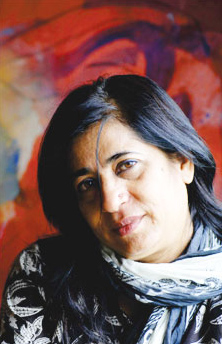
Visiting Fulbright Scholar Rokeya Sultana, professor of art and faculty of fine art at Dhaka University in Bangladesh, will present a slide lecture at noon April 19 in 218 Richards Hall. The lecture will be followed by a 2 p.m. roundtable discussion in Woods Art Building, room 305. Both events are free and open to the public.
Sultana has been in residence in Art and Art History since October. Her lecture will focus on her creative work and the perspective she has on American life.
In addition, her work will be on display in an exhibition at the Rotunda Gallery in the Nebraska Union from May 7-18. A reception will be held May 7, time to be announced.
“I have been impressed by Rokeya’s sense of purpose and openness to rethink her artmaking that her Fulbright opportunity represents, as she is such an accomplished artist already,” said Willa Cather Professor of Art Karen Kunc. “Here she has been willing to shake up her process, to renew her printmaking with experimental approaches — with inevitable failures and successes. She is seeing effects and compositions with a eye that values nuances, irregularities, an aesthetics of mythical chaos. I admire her new works, and her goals to push her art into unfamiliar territories, and to bring new ideas and processes back for her students.”
Sultana met Kunc in 1995 when Kunc traveled to Bangladesh. Sultana has also previously visited UNL in 2000.
“I’m fortunate to have this opportunity to do this research work here,” Sultana said. “Professor Kunc has been so helpful.”
Sultana is researching how to use fewer chemicals in printmaking. Her thesis is titled “Possibilities of Etching and in Representation of Identity.”
“I am learning some techniques here,” she said. “I’m also getting quality time to experiment with new works.”
Her main focus is to explore the idea of womanhood in a changing world of a slowly progressing society using materials that are chemical-free and easy to apply.
“I have been engaged in such experimentation since the last 30 or so years — first as a student and then as a teacher,” Sultana said. “Innovation is a way by which artists find their foothold in the artistic domain, and the experiments that I am pursuing will give me the opportunity to contribute more vigorously to the development of young talents in the institute where I have been teaching since 1987.”
Rokeya’s art is a reflection of loss and displacement, and the impermanence in life. She was influenced in her formative years by the tumultuous 1971 revolution that created Bangladesh, and the evolution of a strong cultural identity in her country’s art and society.
She addresses issues of womanhood and the power of intuition and imagination that can be a feminine attribute that moves into universal truths.
“The very body of woman emerges as the center of human drama, going beyond the bounds of social structures, norms and legal bindings,” she writes in her artist’s statement.
Sultana is an accomplished and award-winning printmaker and painter with recognitions in the ninth Asian Biennale in Dhaka and the third Bharat Bhaban Biennale in India. She has exhibited her work in Poland, Nepal, Korea, Denmark, Pakistan, India, Egypt, Japan and the United States.
Sultana received her MFA from Vishwa Bharati University in India and her BFA from the Institute of Fine Arts at the University of Dhaka in Bangladesh.
Sultana will be in Lincoln until the end of June.
“I’m very grateful to Fulbright for the opportunity to stay this long,” she said. “Nine months gives me the time to get to know people and the heart of the country.”